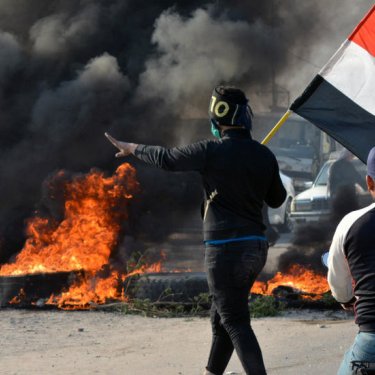Iraqi authorities clamp down on TV channels covering protests

Reporters Without Borders (RSF) is appalled by last week’s decision by Iraq’s media regulator to suspend nine TV channels for three months, issue warnings to four others and shut down four radio stations for good. RSF now holds the Iraqi authorities responsible for the growing restrictions on journalistic reporting in Iraq.
Announced by the Communications and Media Commission on 21 November, the suspensions constitute a major escalation in the state’s harassment of the media in Iraq.
The commission said the nine TV channels were being suspended with immediate effect for three months for “violating broadcast regulations” and “inciting hatred and broadcasting from other countries.”
The nine channels suspended by the commission are the Saudi channels Al-Arabiya andAl-Hadath, the Iraqi Kurdish channel NRT TV, the California-based Syrian channel ANB TV, Amman-based Dijlah TV and four local TV channels: Al-Sharqiya TV, Al-Fallujah TV, Al-Rasheedand Hona Baghdad.
The four radio station that have been closed for good are Radio Al-Nass, Radio Sawa, Radio Al-Yawmand, Radio Nawa. The suspensions were preceded in September by the suspension of the Iraqi operations of the US-funded TV channel Al Hurrafor three months.
Last week’s communiqué also included warnings to Sky News Arabic, a TV channel based in the United Arab Emirates, the Iraqi Kurdish channelRudaw TV, and three local TV channels: Asia TV, Alsumaria TVand Ur TV. It said it would keep the prime minister informed of “the list of TV channels” that incite hatred or broadcast from abroad.
“These official prohibitions confirm the Iraqi state’s direct responsibility in violations of the right to inform,” said Sabrina Bennoui, the head of RSF’s Middle East desk. “Not only have the Iraqi authorities failed in their duty to protect threatened journalists, through weakness or negligence, but now they have gone further by imposing outright bans on media whose coverage of the current protests is not to their liking.”
A few days after the commission’s announcement, men displaying anti-terrorism brigade insignia stormed into Dijlah TV’s offices in Baghdad in order to make the TV channel’s closure effective. But the Iraqi president’s office then denied having ordered the raid and said it had arrested those suspected of carrying it out.
Dijlah TVjournalists were beaten by riot police while covering protests on 26 November. Reporter Mustafa Al-Rikabi sustained a serious head injury in the southern province of Al-Muthanna, while reporter Alaa Al-Shammari and her cameraman Taher Salem were beaten and their equipment was seized in Najaf, 160 km south of Baghdad.
Long before last week’s media regulator communiqué,Al-Arabiya had reported that the police were banning its crews from filming during streets protests. The interior ministry has meanwhile also banned live coverage of protests throughout the country since the end of October. Internet access is also restricted.
Iraq is ranked 156h out of 180 countries in RSF’s 2019 World Press Freedom Index.



